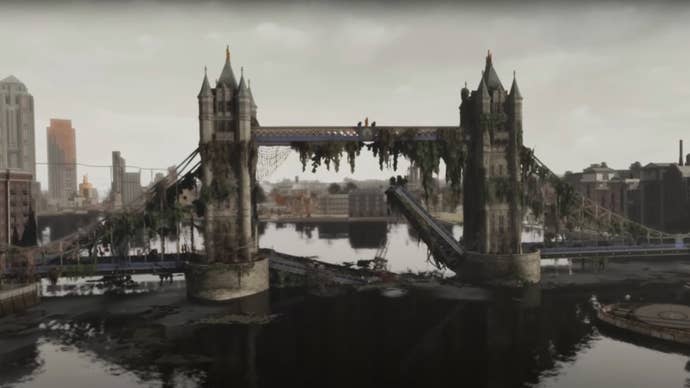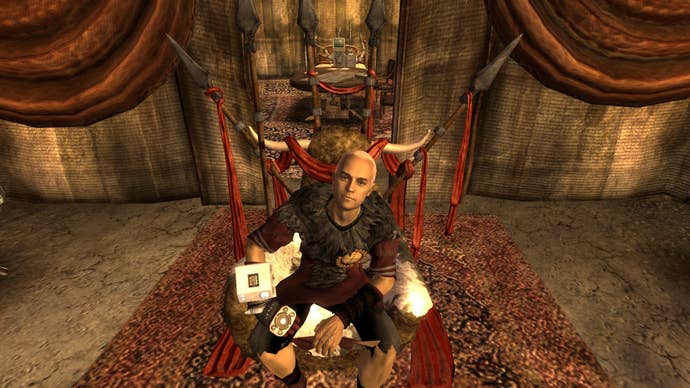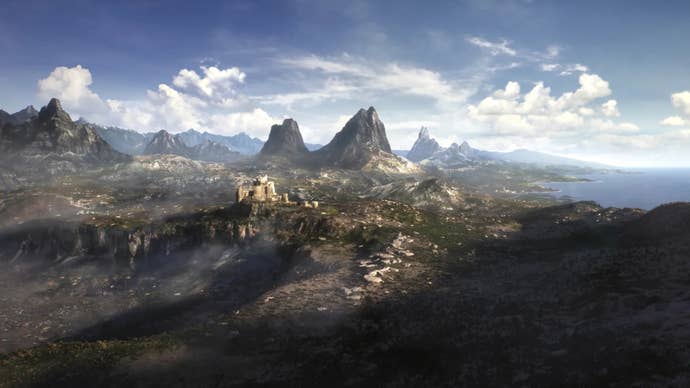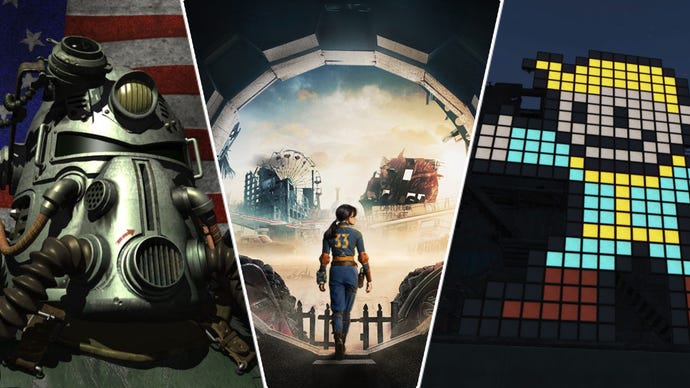The good, the bad, and John the fire dancer - as Fallout gets a TV show, here's how the series' community is doing
“The Fallout community is varied, to say the least.”
“When I think of the fanbase, I do think of those early days when we first announced Fallout 3,” ex-Bethesda artist Jonah Lobe tells me, “We got a lot of hate."
“A lot of those older players felt protective of the franchise - which I can certainly understand, as the IP is immensely unique and special - and some of that translated into hate mail and even death threats, prompting Bethesda to hire its first security guard,” he continues, “So yeah, certainly a passionate fanbase.
“Joking aside, Fallout fans really care about Fallout. They understand that the world of Fallout is very special, and the experience of playing Fallout - with its grit, humour, choice, and unique world-building - is unlike any other. These days, most Fallout fans I meet tell me that their first exposure to the franchise was through Fallout 3 and Fallout 4, and their feedback has been overwhelmingly positive.”
As Lobe alludes to, the community that’s grown up around the Fallout series is as complex and interesting today as any other large fandom you can think of. This week it’s also hitting what arguably feels like the biggest heights it ever has, at least from a mainstream recognition perspective, with the arrival of Amazon’s Fallout TV show. Don’t get me wrong, the series hasn’t been anywhere near niche for a long time now, but this latest bout of Fallout mania might be the largest yet.
So, how’s the community looking and feeling as it crests that wave? Well, as you’d expect with such a large entity, it kind of depends on who you’re asking.
Lobe emphasises that he sees Fallout fans today as largely belonging to one of two distinct communities, depending on when they first approached the series. “Fallout 3 and 4 bridged the gap between the old-school PC gamers who played the game on CD-ROM in the 90s - I was one of these - and the millions of new players who've discovered the game on Steam or console,” he says.
Devann ‘LadyDevann’ McCarthy, who served as a very popular community manager for Fallout 76 - prior to being laid off by Microsoft earlier this year, says that she sees the community these different demographics make up as being “stronger now than ever before”. “There's no shortage of incredible mods, fanart, cosplay, podcasts, roleplay groups, fanfiction, and everything in-between,” she adds, while Fallout content creator Gopher sums things up by saying that, in his estimation, the community “has never stopped improving, and has gone from strength to strength”, especially when it comes to modding.

Fellow content creator Nikki, who goes by the handle Tunnelsnakesfool, shares a similar view to both, despite coming at things from a slightly different angle to McCarthy. “I think this is probably one of the best time periods for the community,” she tells me. “I mean, for me as a creator, [there’s a] different perspective too because I'm looking at engagement and numbers and metrics and stuff like that. But it seems like there's a lot more investment in the franchise again, after Fallout 76 came out.
“There is a very loyal fan base [for] 76,” she explains, “but it didn't do what a lot of us hoped it would for the community, [things] got quiet and a lot of us noticed less engagement and less activity in our Discord servers, stuff like that. So now, with everything that's happening this year, it is one of the best times to be part of the community.”
While it might not have garnered quite the same attention or acclaim as many of its peers, Fin, one of the Overseers of the Independent Fallout Wiki, tells me that, in his view, 76 has still shown how nice the community can be when it’s at its best. “The community is generally kind and helpful to someone new,” he explains, “supplying them with all sorts of equipment that can help them out in their character's early stages.”
Among the other examples of this, the team behind the Wiki and the other folks I spoke to cited the likes of charity initiative Fallout For Hope and the Fallout New Vegas day meetups in Goodsprings, Nevada. Regarding the latter, McCarthy says: “I think what makes this such a standout instance, is that the event doesn't come from Bethesda Game Studios.
“When I was employed as the Community Manager for Fallout, I would send the Pioneer Saloon free merchandise to giveaway to attendees,” she explains, “but otherwise the entire event was made by fans, for fans. Having the absence of the Studio in its creation and organisation makes the event so genuine in the way that there are no alternative motives on an advertising or marketing side, it's purely for the fun and love of the franchise and because of that, the fans are able to do so much more with it.”

A fun example of exactly this comes from another of the Independent Fallout Wiki’s Overseers, who goes by Blubbin. “A friend of mine, John, performed a fire dance show near the end of each night,” he says of last year’s New Vegas day meetup. “He got massive support from everyone there and drew a large crowd, even though the action had nothing to do with Fallout. People just wanted to show their support for this community member and his passions, and I really think that was great.”
That said, as numerous members of the team - which runs a public Discord server dedicated to the series - tell me, as you’d expect given its size, things aren’t always sunshine and roses when it comes to the Fallout fandom. “The Fallout community is varied, to say the least,” says Rimuru_mayhem, who serves as a member of “Future-Tec” - the fitting way the team refers to its community-focused support staff. “On one hand you have lovely people, and on the other hand you have degenerate bootlickers who’ve missed the point of the games entirely.
“An example for the latter would be a Fallout Discord server I joined a while back that was absolutely infested with Legion and Enclave fanboys, as well as actual nazis. Unsurprisingly, it was also heavily homo and transphobic. I think it’s hard to say ‘Fallout’s community is definitely this or that’, because it is still very diverse in terms of what people got out of it and personal beliefs. I’m tentatively hoping its community gets a lot more progressive, but I don’t know if we’ll ever be rid of people with zero media literacy.”
Solomon742, another member of the team, emphasises that while groups like this do exist and their presence is a concern for many members of the fandom, he sees them as just being “the consequence of having a large community”. “These people are easy to avoid/ignore”, he says, “Overall, [the community] is a force of positivity.” Meanwhile, another Wiki team member, Narratorjack, says that in her estimation, the community is “better than it has been in the past”. “While there are still problematic characters from time to time,” she asserts, “things such as fanboyism, gatekeeping, and similar issues are less of an issue than they used to be.”

Thankfully, both former Bethesda employees I spoke to, McCarthy and Lobe, framed their current experiences with the fandom in terms that seemed to mirror these assessments. “My relationship with the community has been exceedingly pleasant,” the latter says. “Those who trash-talked the game have largely moved on, and they've left a legion of the die-hard and steadfast. These folks celebrate the history, the lore, the devs, and the attention to detail. This all goes triple, of course, for the modding community; their efforts keep the game (and spirit of the game) alive long, long after release.”
So, with all that said about where things stand in the Fallout community, how have folks been feeling about the TV show’s arrival?
“The release of the TV show opens up so many doors to new audiences, it is really exciting to think about an entirely new generation of fans experiencing this crazy and wacky world that is Fallout for the first time ever,” McCarthy says. “I can't wait to watch livestreams of first playthroughs, there really is something so incredible [in seeing] someone experience leaving the Vault for the first time. I'm also really excited for the cosplays and prop replicas that will come out of this! The community is so welcoming and creative, I really hope the TV show brings in even more new faces and creative minds.”
“I'm gonna hope it lasts long. I want more seasons, that'd be great,” Tunnelsnakesfool tells me. She adds that, from the perspective of Fallout content creators, the show represents a bit of a different challenge. “This is such a brand new thing, where covering the show just as a show that's still part of this franchise would be completely new, and all of us are going to try our hand at how we're going to do it.”
In addition to wanting to see where the show ends up going, the members of the Fallout community I spoke to held a range of different views on where the series is at game-wise following Fallouts 4 and 76, with thoughts ranging from satisfaction to generally mild concern. Though, as a lot of them allude to, how the feeling among fans actually stands when it comes time to release Fallout 5 will likely depend heavily on how The Elder Scrolls 6 is received, assuming it arrives first, as is very much expected.

“I do feel that Bethesda could really do with a plain old ‘win’ for [its] next release,” Gopher says. “I am sure that they do not enjoy the negativity they have been receiving for the last few years. No matter what people say, everyone wants people to love what they have made.” He adds that, when it comes to where Fallout is at right now, he’s pretty optimistic. “I am actually quite hopeful, because while I did not like the multiplayer aspect of Fallout 76, there were signs that Bethesda had abandoned some of the design changes [from Fallout 4] - [the] voiced protagonist for example - that I did not like. I think that Bethesda knows what the fanbase wants, and that’s half the battle. The only question in my mind is if [it] will deliver.”
Interestingly, Tunnelsnakesfool told me that she could potentially see a reality where Fallout 5 actually ends up being a very different kind of test for Bethesda than The Elder Scrolls 6 will be. “Pete Hines just retired, I feel like Todd is going to retire after the next Elder Scrolls [game]. I don't see him staying on another five, six years. I think he's in his mid-50s and, you know, he's wealthy.” So, she suggests, if that were to happen, the next Fallout game: “would be more like a ‘Can bethesda do it without Pete and Todd?’, the big two, you know? And it would be more [a prove it moment] for the next generation of Bethesda, than anything.”
Up until then, as we get further and further away from those early days of Fallout 3 that Lobe alluded to, the community seems keen to get as much Fallout as it can. For some I spoke to, it’s more TV show-style media, for others it’s comics, and for a fair amount, it’s more spin-off games, preferably ones that might end up closer in terms of widespread reception to a New Vegas than a 76, even if they don’t directly mirror the former in terms of concept.
So, there are definitely plenty of things fans want to see or are open to trying Fallout-wise going forwards, even now it’s finally made that big leap to the big screen. Though, there is one idea, suggested by the Fallout Wiki’s Blubbin after he discussed the idea of spin-off games in different genres, that I think we can all agree Bethesda needs to make happen.
“I'm more attached to the world than I am the gameplay in particular,” he said. “Basically, what I'm saying is, give me Fallout Kart.”
 |
Start a free 30-day Amazon Prime Video trial and get access to thousands of movies and TV shows, games and more! Only $14.99/ £8.99 per month after the trial has ended and you can cancel anytime. |

